Residential property market in Beirut commands second highest price in region
The recently released Global Property Guide’s annual report ranked Lebanon’s capital city second highest in residential prices in the Arab world, though sellers are offering discounts to move inventory.
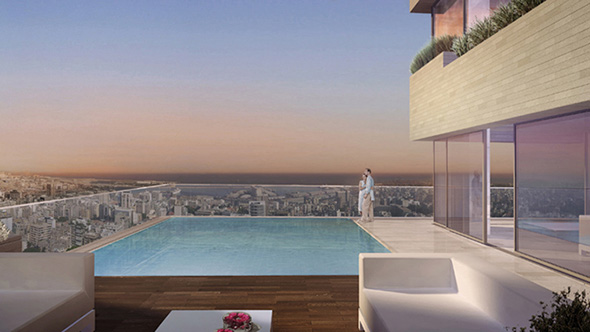
Residential property market in Beirut commands second highest price in region
By T.K. Maloy
BEIRUT — The recently released Global Property Guide’s annual report ranked Lebanon’s capital city second highest in residential prices in the Arab world, though sellers are offering discounts to move inventory.
Also, the report rates Beirut as 43rd globally in terms of house prices and 55th in rental yield, with the conclusion that property on the whole still remains somewhat overvalued.
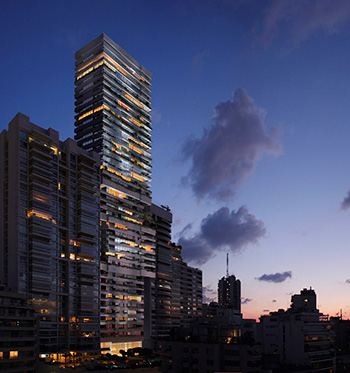
The GPG report ranks Beirut among 94 markets worldwide for the final economic quarter of last year. The city ranked in second place among the MENA region on prices for a 150 square meter apartment, with the average price at $3,693 per sqm. The report also noted that demand in the city – particularly from wealthy foreign buyers – had fallen markedly because of Lebanon ongoing domestic political tensions and the growing Syrian conflict.
Nevertheless, Global Property said in late October that “Property prices still remain surprisingly resilient in Lebanon, though some developers are offering about five percent to 10 percent discounts to home buyers.”
Nabil Sawabini, CEO of MENA Capital, one of Lebanon’s largest developers — also a player in the Gulf region — while bullish on the future outlook for residential sales and pricing, noted that the last several years have been difficult on the industry.
“The last two and a half years in particular have been quite challenging in this market….The political roller coaster has had a great impact on the economy and obviously on investment in Lebanon. However, we hope that this is about to change and in a broader sense than just in Lebanon,” Sawabini told Marcopolis in a recent interview.
“I believe that sales will pick up, but prices will remain stable until such time when there is more equilibrium in the demand vs. supply in the market,” he confidently noted.
The company has rolled with the punches, and Sawabini said that MENA has also been fortunate in terms of development locations. He added that starting two years ago, the company began to meet the needs of the young professional couple by downsizing flat sizes after sales markedly dropped off from wealthy Gulf buyers for larger flats. Altogether, he noted, sales have been running at a steady clip.
“We have been quite fortunate in our developments because we have always emphasized location, which is always the most important criteria in investing in real estate. Also, we have created an image of quality that people are attracted to,” says Sawabini.
“We have been quite fortunate in our developments because we have always emphasized location, which is always the most important criteria in investing in real estate. Also, we have created an image of quality that people are attracted to,” Sawabini said. “The fact that we have tried to focus our developments on what the needs appear to be in the market has helped us a lot. Thus, we do’ have any development that is less than 60 or 70 percent sold, and in some cases it is higher than that.”
He added, “As to the size of residences, the demand has trended towards smaller size apartments, which we are adopting in the newer projects.”
Karim El-Hajjar of H.E.C (El-Hajjar Enterprises Company), a boutique developer of quality pre-fabricated wood housing, and smaller scale apartment blocks — but with the same emphasis on quality, mixed use and community planning that Sawabini employs — noted for Marcopolis that property on Lebanon has always been on an upward trend.
“From a financial perspective, real estate never went down. I can say that because it is the case for the last 55 years. It is not because we have the best country, it is because we do’ have enough land,” El-Hajjar said, adding, however the many positives to living in Lebanon. “We also have good weather, good swimming pools, good restaurants, good wine and excellent food etc. We have really great beach resorts such as Edde Sands. We are service orientated and multilingual. This all creates a fun aspect to living here.”
And young couples and Lebanese expatriates wanting a second property agree. Lebanon is a lively mix of business, sun, ski, cuisine and fun for all ages.
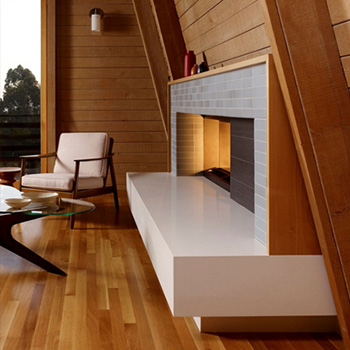 “Our main customer focus is mid to lower income. This does not mean we are building low quality. We are building really high end quality properties in good locations. (But) Our main focus has changed, we are focusing on actual buyers and users. We have opportunities for investors as I said before to invest on a returns on investment basis on some of our projects. We are not selling buildings to one investor for example and then waiting for them to re sell. We are selling to actual home owners,” El-Hajjar said of his business philosophy and sales focus. “This creates a stability in our country whereby if I am building 300 units it is because I have demand for 300 units. I am not expecting to have five demands (from large investors) that can handle 300 units. Our main focus right now is the end user and creating a good global service.”
“Our main customer focus is mid to lower income. This does not mean we are building low quality. We are building really high end quality properties in good locations. (But) Our main focus has changed, we are focusing on actual buyers and users. We have opportunities for investors as I said before to invest on a returns on investment basis on some of our projects. We are not selling buildings to one investor for example and then waiting for them to re sell. We are selling to actual home owners,” El-Hajjar said of his business philosophy and sales focus. “This creates a stability in our country whereby if I am building 300 units it is because I have demand for 300 units. I am not expecting to have five demands (from large investors) that can handle 300 units. Our main focus right now is the end user and creating a good global service.”
El-Hajjar added, “Right now we have the best interest rates for mortgages, we have good relationships with a variety of banks. This year we have worked with the Bank of Beirut for mortgages and housing loans. We have a 10 percent down payment on our units with 30 years financing at a rate of 2.5% interest.
Like Sawabini, El-Hajjar also observed the change in size offering throughout the residential sector from that of the previous years.
“For the last five years there was a lot of focus on Beirut with tower buildings, high end developments, large apartments of 300 to 600m2 etc. However to be honest there is not a lot of demand (currently) for something like that,” El-Hajjar said. “Even if people can afford that, lately they are preferring to go the European way. They would rather buy a nice 150m2 house with really nice decorations and a good location because they do’ really need much more space. People are becoming more used to going out and inviting friends to restaurants.”
Global Property bases its valuation data on upper-end apartments in upscale areas, with the report covering the districts of Achrafieh, Ain El Mreisseh, Ain El Tineh, Clemenceau, Hamra, Manara, Raouche, Sanayeh, the Beirut Central District, Ramlet El Baida, Verdun and Saifi districts.
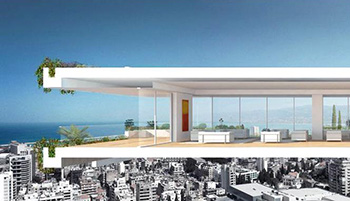 In the recent report, the hottest market was no surprise, with Global Property noting in a release, “After two years of spectacular house price rises, Dubai’s housing market continues to grow stronger, with house prices soaring by 21.52 percent during 2013, after rises of 21.64 percent in 2012,” and 6.3 percent for 2011.
In the recent report, the hottest market was no surprise, with Global Property noting in a release, “After two years of spectacular house price rises, Dubai’s housing market continues to grow stronger, with house prices soaring by 21.52 percent during 2013, after rises of 21.64 percent in 2012,” and 6.3 percent for 2011.
Additionally, the report ranked Beirut at 55th place for Gross Rental Yield (GRY) in Q4 of last year out of 84 markets studied and in last place in 2013 among 84 markets globally and in last place among five Arab markets.
In the real estate world, GRY is the return-on-investment before taxes, maintenance fees and other costs, and is used a key part of the buying calculation among potential investors. The GRY for the total year was 4.51 percent in comparison to the Arab average of 6.86 percent. While the GRY was consider by the Global Property survey as “very poor” for 2012 and was improved to “poor” for last year.
In term of rent-per-month, Beirut rated 30th among the 84 markets surveyed and in second place among the five Arab markets studied. For a 150 sqm flat, the rent-per-month was $2,082 in comparison to the Arab average of $1,715 per month.
Lastly, Beirut was ranked at fourth place among nine Arab markets in terms of “Round-trip Transaction Cost,” a valuation with includes the total costs of buying and reselling a residential property as a percentage of property value. In Lebanon, the total cost includes registration costs, real estate agents’ commissions, legal fees and sales and transfer taxes, all of which can significantly add to the cost of buying a residential property. The Round-trip Transaction Cost for buying in Beirut hit 11.57 percent in comparison to the regional average of 8.1 percent.
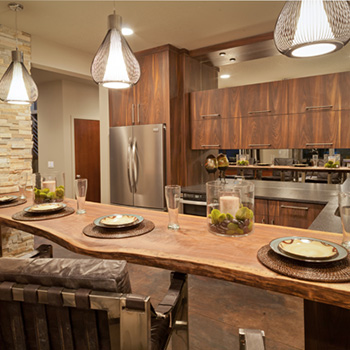 While lower than the RTC for Jordan (12.9 percent), Egypt (12.3 and Morocco (12.1), buying in the Levant was higher than the UAE (9.0), Tunisia (7.1), Bahrain (5.0, Oman (3.0) and Qatar, which clocked in at zero percent.
While lower than the RTC for Jordan (12.9 percent), Egypt (12.3 and Morocco (12.1), buying in the Levant was higher than the UAE (9.0), Tunisia (7.1), Bahrain (5.0, Oman (3.0) and Qatar, which clocked in at zero percent.
Political tensions have eased somewhat for Lebanon recently with the formation of a unity cabinet and the still on schedule plans for an end May presidential election.
Prior to 2012, Beirut property, particularly larger, in-town flats had been steady market for the property development and sales sector, particularly properties oriented toward wealthy Gulf investors. That trend dramatically dropped with the increase in sectarian tensions and realtors consequently adjusted their construction toward the middle-level and the “young executive” with flats averaging at around the 150 sqm range.
Expectations are for an industry comeback, but more diversified that previously, with quality, mixed-used communities and midsized apartment blocks becoming more the standard than the previous push toward luxury flats.
Beirut, also, still holds a strong allure for well-off expatriate Lebanese who maintain property here and the surrounding environs as summer homes and holiday flats.
|
Sawabini: When it comes to Luxury, Sky is the Limit BEIRUT — “Sky Gate´s design and architecture, as well as quality of materials and finishing, is certainly one of the best if not the best in the region. The assigned architect is well known internationally: Nabil Gholam. For the lobbies and the ground floor, he has been supplemented by a very famous New York based architect, Peter Marino. Sky Gate’s design was awarded a highly commended prize by MIPIM in 2009,” CEO Nabil Sawabini told Marcopolis. “In addition, the location is superb, because it is the highest point in Beirut. The exposure that you get in the higher floors is really 360o. Furthermore, the amenities are some of the best you can find, whether it is the spa, the indoor and outdoor swimming pools, the beautifully planned gardens surrounding the building, the running track at the periphery of the property, not to mention the spacious parking.” |
FAIR USE POLICY
This material (including media content) may not be published, broadcasted, rewritten, or redistributed. However, linking directly to the page (including the source, i.e. Marcopolis.net) is permitted and encouraged.